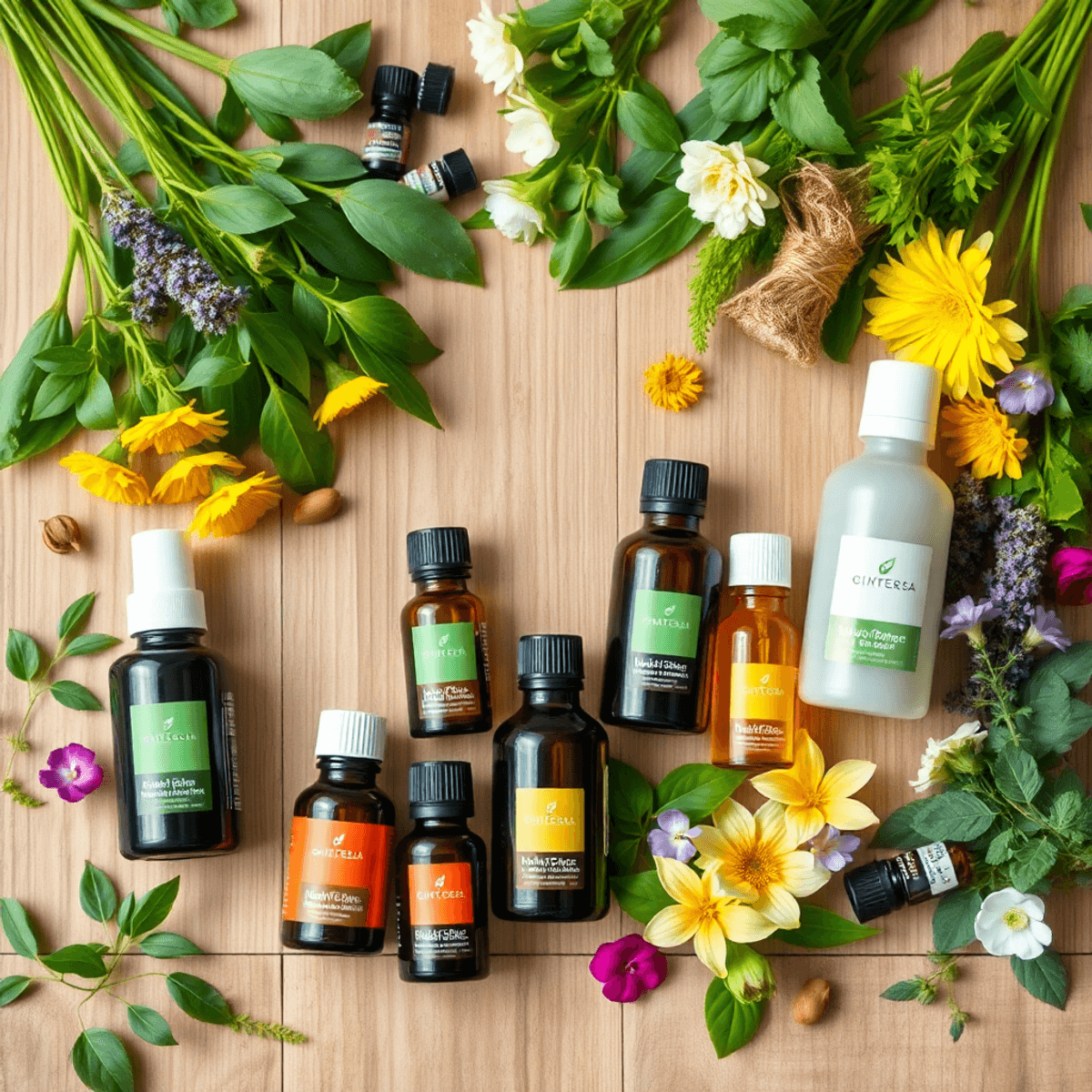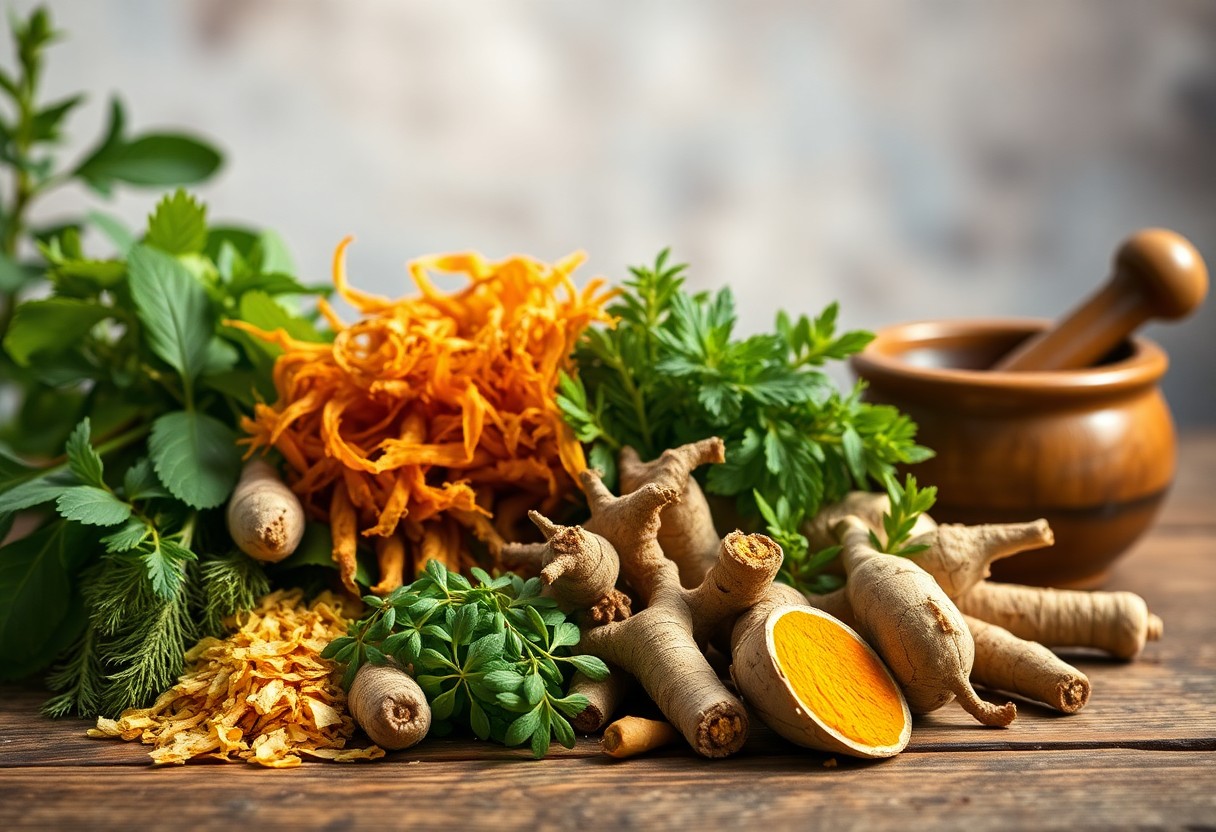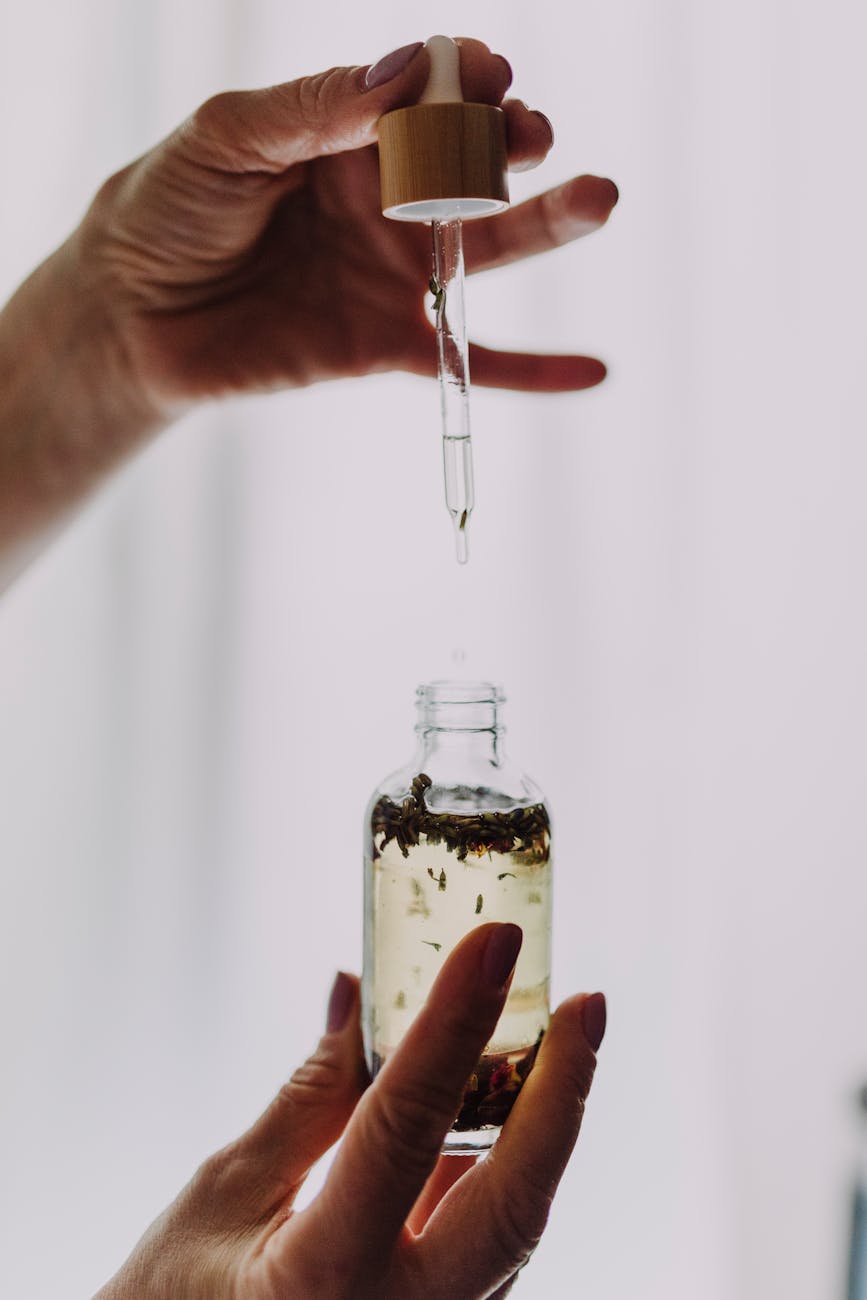Essential oils are powerful plant extracts that can help you achieve healthy, glowing skin. They can address a variety of skin issues such as acne and aging.
What makes essential oils special is their versatility and natural healing properties. Each oil has its own unique benefits that work in harmony with your skin’s natural processes. Whether you’re dealing with dryness, breakouts, or looking for a youthful glow, there’s an essential oil out there that can transform your skin.
In this article, we’ll explore the world of essential oils for skin health and discover how these botanical wonders can revolutionize your skincare routine. You’ll learn about the most effective oils and practical ways to incorporate them safely into your daily regimen.
Understanding Essential Oils
Essential oils are concentrated plant extracts derived from various parts of plants, including leaves, flowers, stems, and roots. These powerful natural compounds capture the essence and therapeutic properties of their source plants through specialized extraction methods.
How Essential Oils Are Extracted
The extraction process typically involves:
- Steam Distillation: Plant materials are exposed to steam, releasing volatile compounds
- Cold Pressing: Mechanical pressure extracts oils from citrus peels
- Solvent Extraction: Used for delicate flowers like jasmine and rose
- CO2 Extraction: A modern method producing pure, high-quality oils
Benefits of Essential Oils in Skincare
In skincare, these potent botanical extracts serve multiple purposes:
- Balancing sebum production
- Fighting bacteria and inflammation
- Promoting cell regeneration
- Providing antioxidant protection
- Enhancing skin barrier function
The concentration of these oils makes them incredibly potent – a single drop of rose essential oil requires approximately 30 roses to produce. This potency explains why essential oils are rarely used undiluted in skincare applications.
The Benefits of Essential Oils for Skin Health
Essential oils are powerful plant extracts that can transform your skin and address various skin issues naturally. These concentrated oils offer three main benefits for your skin:
1. Anti-inflammatory Action
The natural compounds found in essential oils have anti-inflammatory properties that can help reduce redness, soothe irritation, and calm sensitive skin conditions. This makes them effective for conditions like eczema, rosacea, and general skin inflammation.
2. Antimicrobial Protection
Many essential oils contain antimicrobial properties that can fight harmful bacteria on the skin. This helps prevent acne breakouts and maintain a healthy skin barrier.
3. Deep Hydration
Essential oils have a unique molecular structure that allows them to penetrate deep into the layers of the skin. This means they can deliver moisture and nutrients exactly where your skin needs it most.
Your skin has a natural affinity for plant-based ingredients, which is why essential oils can be such a gentle yet effective alternative to synthetic skincare products. The active compounds in these oils work in harmony with your skin’s natural processes, supporting its ability to heal and regenerate.
These natural remedies have been used for centuries – ancient civilizations relied on them for skin healing, and modern research is now confirming their effectiveness for various skin concerns.
1. Lavender Oil
Lavender oil is a staple in natural skincare, known for its gentle yet effective properties. This versatile oil works well with different skin types, making it an essential part of your skincare routine.
Key Benefits:
- Reduces redness and inflammation
- Speeds up the healing of wounds
- Regulates oil production
- Soothes sensitive skin reactions
- Kills acne-causing bacteria
Application Tips:
- Mix 2-3 drops with your favorite moisturizer
- Create a spot treatment by combining with tea tree oil
- Add to bath water for full-body skin benefits
Best For:
- Sensitive skin
- Areas prone to acne
- Sunburned skin
- Dry patches
- Irritated skin conditions
Recommended Dilution:
For facial application: Mix 1 drop of lavender oil with 1 teaspoon of carrier oil like jojoba or sweet almond oil
The gentle nature of lavender oil makes it suitable for daily use, especially during your evening skincare routine when your skin is actively repairing itself.
2. Tea Tree Oil
Tea tree oil is a powerful natural remedy for various skin issues. It has strong antimicrobial properties that effectively fight acne-causing bacteria. Its natural antiseptic qualities make it particularly effective for:
- Reducing active breakouts
- Controlling excess oil production
- Calming inflamed skin
- Preventing future blemishes
You can use tea tree oil in two ways:
- Moisturizer: Add 2-3 drops of tea tree oil to your regular moisturizer and apply it as usual.
- Spot treatment: Mix tea tree oil with a carrier oil (such as jojoba or coconut oil) to create a concentrated spot treatment.
For best results, apply tea tree oil directly to problem areas using a cotton swab.
Pro tip: Start with a lower concentration (1%) and gradually increase as your skin adjusts. Tea tree oil can be potent, so patch testing is essential before full application.
3. Frankincense Oil
Frankincense oil, often referred to as the “king of oils,” offers remarkable anti-aging advantages due to its distinctive capability to encourage cell regeneration. This ancient oil penetrates deeply into the skin, promoting the creation of new skin cells while diminishing existing scars and blemishes.
Key benefits for your skin:
- Reduces the appearance of age spots
- Minimizes surgical and acne scars
- Tightens and tones sagging skin
- Balances skin tone
- Diminishes stretch marks
You can harness frankincense oil’s regenerative properties by adding 2-3 drops to your favorite moisturizer or facial oil. For targeted scar treatment, mix with a carrier oil like jojoba and apply directly to affected areas twice daily.
Pro tip: Choose high-quality frankincense oil sourced from Boswellia trees for maximum skin benefits.
4. Geranium Oil
Geranium oil is a powerful skin balancer, making it a versatile addition to your skincare routine. This remarkable oil adapts to your skin’s needs by regulating sebum production – reducing excess oil in oily areas while boosting hydration in dry patches.
Key Benefits for Your Skin:
- Balances oil production across different facial zones
- Strengthens skin’s natural barrier function
- Improves skin elasticity and firmness
- Reduces the appearance of enlarged pores
- Promotes an even skin tone
The oil’s astringent properties help tighten sagging skin, making it particularly beneficial for mature skin types. You can mix 2-3 drops with your favorite moisturizer or facial oil for optimal results. Its gentle nature makes it suitable for daily use, though a patch test is recommended for first-time users.
5. Chamomile Oil
Chamomile oil is a gentle yet powerful option for sensitive and irritated skin. This calming essential oil contains bisabolol and chamazulene, natural compounds with strong anti-inflammatory properties.
Key Benefits:
- Reduces redness and skin irritation
- Soothes eczema and psoriasis flare-ups
- Accelerates skin healing
- Provides deep hydration
You can enjoy the benefits of chamomile oil by adding 2-3 drops to your favorite moisturizer or facial oil. For targeted treatment of irritated areas, mix with aloe vera gel for enhanced soothing effects.
The oil’s natural hydrating properties help maintain your skin’s moisture barrier, making it especially effective for dry, sensitive skin types. Its gentle nature makes it suitable for daily use in your skincare routine.
6. Rose Oil
Rose oil is a luxurious skincare ingredient that is especially beneficial for mature skin types. It offers a range of benefits, including:
- Reducing visible signs of aging
- Locking in moisture for extended periods
- Strengthening the skin barrier
- Balancing skin tone and texture
This precious extract works wonders for your skin in multiple ways:
- Stimulating collagen production: The natural compounds found in rose oil help stimulate collagen production, which can minimize the appearance of fine lines and wrinkles.
- Creating a protective barrier: The exceptional moisture-retention properties of rose oil create a protective barrier that keeps your skin hydrated throughout the day.
Key Benefits for Your Skin:
- Rich in vitamin C and antioxidants
- Natural anti-inflammatory properties
- Helps repair sun damage
- Promotes skin cell renewal
For best results, mix 2-3 drops of rose oil with your favorite moisturizer or carrier oil. Apply this blend to clean skin, focusing on areas prone to fine lines and dryness.
7. Neroli Oil
Neroli oil is extracted from orange blossoms and is known for its effectiveness in treating problematic skin types. It is particularly beneficial for oily and acne-prone skin as it helps to balance sebum production.
Key benefits of neroli oil:
- Regulates excess oil production
- Minimizes the appearance of enlarged pores
- Reduces acne breakouts
- Stimulates cell regeneration
- Boosts collagen production
The unique properties of neroli oil make it effective in addressing both signs of aging and oily skin concerns. Its gentle nature allows for regular use without causing irritation, making it suitable for all skin types. Additionally, its powerful antioxidants provide protection against environmental damage.
To incorporate neroli oil into your skincare routine, you can add 2-3 drops to your favorite moisturizer or mix it with a carrier oil for a nourishing facial treatment.
8. Sandalwood Oil
Sandalwood oil is a luxurious skincare ingredient with powerful hydrating properties. This rich, woody-scented oil penetrates deep into the skin layers to provide lasting moisture retention.
Your dry, flaky skin can benefit from sandalwood oil’s natural emollient properties. It creates a protective barrier that locks in moisture while allowing your skin to breathe.
Key benefits of sandalwood oil include:
- Deep hydration for parched skin
- Natural anti-inflammatory properties to reduce redness
- Helps maintain skin’s moisture balance
- Soothes irritation and sensitivity
For optimal results, mix 2-3 drops of sandalwood oil with a carrier oil like jojoba or sweet almond oil. Apply this blend to clean skin, focusing on dry patches. The oil’s gentle nature makes it suitable for daily use, particularly during harsh weather conditions or in dry climates.
9. Pomegranate Seed Oil
Pomegranate seed oil is a powerful antioxidant for your skin. It contains punicic acid, which fights free radicals and protects your skin cells from damage caused by the environment.
Key benefits include:
- Stimulates collagen production
- Repairs sun-damaged skin
- Reduces dark spots and hyperpigmentation
- Promotes skin cell regeneration
You can use pomegranate seed oil’s anti-aging properties by adding 2-3 drops to your daily moisturizer. For targeted treatment, mix it with a carrier oil like jojoba at a 2% dilution ratio and apply directly to areas showing signs of aging.
The oil’s lightweight texture makes it suitable for all skin types, including sensitive and acne-prone skin. Its natural vitamin C content brightens your complexion while supporting the skin’s protective barrier.
10. Helichrysum Oil
Helichrysum oil is a powerful oil for regenerating the skin. It is extracted from the Helichrysum italicum plant and is known for its ability to reduce the appearance of wrinkles and fine lines.
Key benefits for your skin:
- Stimulates collagen production
- Reduces the appearance of age spots
- Improves skin elasticity
- Minimizes scarring
- Enhances skin texture
The natural compounds in this oil help repair damaged skin cells, making it especially effective for mature skin types. You can add 2-3 drops to your favorite moisturizer or mix it with jojoba oil for direct application. Its gentle nature makes it suitable for daily use, although its higher price means you’ll want to use it strategically for maximum benefit.
How to Use Essential Oils Safely on Skin
Safe application of essential oils requires proper dilution and testing. You must mix essential oils with carrier oils before applying them to your skin. Here are the recommended dilution ratios:
- For facial applications: 1% dilution (1 drop essential oil per 1 teaspoon carrier oil)
- For body applications: 2-3% dilution (2-3 drops essential oil per 1 teaspoon carrier oil)
Popular carrier oils include:
- Jojoba oil
- Sweet almond oil
- Coconut oil
- Argan oil
- Grapeseed oil
Patch testing is crucial before using any new essential oil. Apply a small amount of your diluted mixture to the inside of your forearm:
- Wait 24 hours
- Monitor for any reactions:
- Redness
- Itching
- Burning
- Swelling
If you experience any adverse reactions during the patch test, discontinue use immediately. Each person’s skin responds differently to essential oils, making patch testing an essential safety step in your skincare routine.
Precautions When Using Essential Oils For Skin Health
Essential oils require careful handling to ensure safe and effective use. Here are critical precautions to consider:
Citrus Oil Sensitivity
- Bergamot, lemon, and orange oils can increase your skin’s sensitivity to UV rays
- Apply citrus-based oils at night
- Use SPF protection during daytime if these oils are part of your routine
Individual Skin Reactions
- Your skin’s response to essential oils is unique
- Common signs of adverse reactions:
- Redness
- Itching
- Burning sensation
- Rashes
Special Considerations
- Pregnant women should consult healthcare providers before use
- Some oils may interfere with medications
- Avoid applying oils near eyes, inside nose, or on sensitive areas
- Stop use immediately if irritation occurs
Storage Guidelines
- Keep oils in dark glass bottles
- Store in cool, dry places
- Check expiration dates regularly
- Avoid exposure to direct sunlight
Remember: what works for others might not work for you. Start with minimal amounts of the best essential oils for skin health and adjust based on your skin’s response.
Conclusion
The best essential oils for skin health offer a natural way to achieve radiant, healthy skin. From lavender’s calming effects to tea tree’s powerful bacteria-fighting properties, these plant-based wonders can completely change your skincare routine.
Start Your Essential Oil Skincare Journey
Your journey into essential oil skincare can begin with small steps:
- Add 2-3 drops of lavender oil to your nightly moisturizer
- Mix tea tree oil with your face wash for extra cleansing power
- Create a custom facial serum using frankincense and rose oils
Here’s Your Action Plan:
- Choose one oil that addresses your primary skin concern
- Purchase a high-quality carrier oil like jojoba or sweet almond
- Start with a simple DIY blend
- Document how your skin reacts
Remember to pay attention to what your skin needs and make adjustments as necessary. Every person’s skin has its own unique story – yours might respond well to the moisturizing effects of rose oil while benefiting more from the balancing properties of geranium.
Take action today. Grab a bottle of your selected essential oil and discover the incredible benefits these natural remedies can bring. Your skin deserves the healing touch of nature’s most potent plant extracts.
Discover more from NatureZen Market
Subscribe to get the latest posts sent to your email.











Essential oils is very helpfull for skin health, they can reduce wrinkles and also hydrate skin. When using them, it’s important to dilute them properly or can cause irritation. Always do a patch test first to avoid bad reactions.